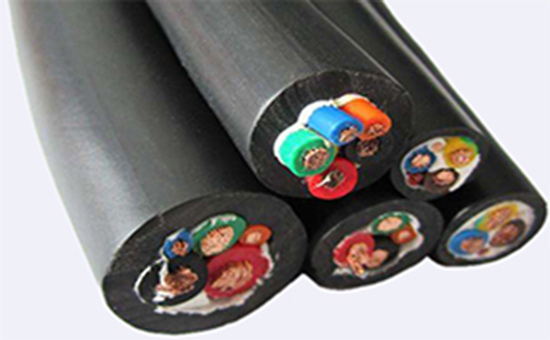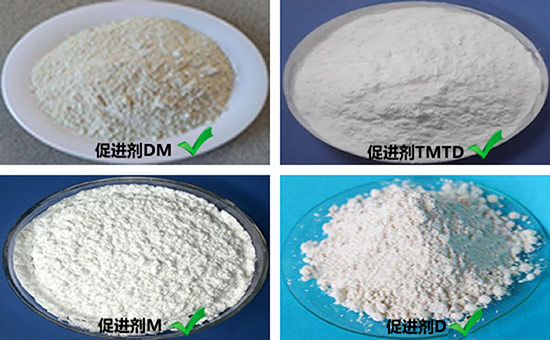Rubber accelerator is a chemical substance used to accelerate the rubber vulcanization process, which plays a role in shortening the vulcanization time, reducing the vulcanization temperature, and reducing the amount of vulcanizing agent in the formula. When using reclaimed rubber to produce rubber products, rubber accelerators are indispensable; In the mixing process of reclaimed rubber, the dispersion of accelerator is the key factor affecting its efficiency. So what are the characteristics of commonly used rubber accelerators in the compounding process? What should I pay attention to when mixing?
1. Physical form of rubber accelerator
Rubber accelerators are usually powdered substances and are used in smaller amounts in compounding agents. In the mixing process of the open mill, powder accelerators are particularly suitable due to the difficulty of reaching the melting point. In order to reduce dust flying and loss, accelerators are often processed into loose balls or granules, or coated with mineral oil, or pretreated with oil and stearate as dispersants, or even made into masterbatches for easy dispersion.
2. Dispersion of rubber accelerators
The accelerator must be evenly mixed and well dispersed in the rubber compound, especially when using reclaimed rubber to produce wires and cables. In actual production, the dispersed state of the accelerator directly affects the vulcanization characteristics and treatment performance of the reclaimed rubber compound. For example, in the preparation of rubber mixtures of isoprene rubber and isoprene reclaimed rubber, the dispersion of accelerator CZ is different, which will lead to changes in crosslink density and tensile strength.

3. Characteristics of the mixing process of different varieties of rubber accelerators
Different types of rubber accelerators have different dispersion properties. When mixing reclaimed rubber, accelerator M is easy to disperse, accelerator DM is difficult to disperse, and hyposulfonamide accelerator is very easy to disperse. In natural rubber, styrene-butadiene rubber, EPDM rubber and their combined rubber, the dispersion of accelerators is about the same, and in the combined rubbers of butadiene rubber and natural rubber, the dispersion of accelerators is slightly worse. Compared with the original rubber, the rubber accelerator has better dispersion in the reclaimed rubber.
4. Effect of the mixing process on the dispersion of accelerator
In the processing process of reclaimed rubber products, the mixing process has a significant impact on the dispersion of accelerators. Poor dispersion will result from improper handling of the compounding process or the presence of water in the accelerator. In the mixing machine, zinc oxide and filler are added first, and then accelerator is added to prepare reclaimed rubber 2SLYY125 compound with better physical and mechanical properties. In addition, when mixing reclaimed rubber, the mixing temperature must be strictly controlled below the decomposition temperature of the accelerator to avoid the failure of the accelerator; If the mixing temperature of the accelerator reaches above the decomposition temperature, it will lose its after-effect; If necessary, the two-stage mixing process can be used.
5. In the process of compounding of reclaimed rubber, rubber accelerator is generally added 1~2 minutes before debinding, or added after debinding on the tablet press; Ensure homogeneous dispersion of accelerators.

6. Thermal stability of rubber accelerators
After heat treatment, the viscosity, scorching time and vulcanization rate of Mooney containing accelerator may change, and some accelerators may fail, especially sulfenamides and accelerator D, and the scorching time will be shortened after heating, so when mixing reclaimed rubber in the internal mixer, it is necessary to pay attention to the temperature when adding accelerator, and timely tableting and cooling.
When using reclaimed rubber to produce rubber products, understanding the compounding process characteristics of rubber accelerators is essential to ensure the performance and processing efficiency of the products. By rationally selecting accelerators and optimizing the mixing process parameters, the processing performance and vulcanization efficiency of recycled rubber can be significantly improved. Strict control of mixing temperature, dispersion of accelerator and accurate grasp of addition timing are the keys to achieving efficient mixing.
Exclusive original article [commercial authorization] reprint, excerpt and excerpt in any form are prohibited without written authorization. Focus on Hongyun rubber: learn the process formula and raw material technology of producing rubber products from recycled rubber to help you reduce costs and increase profits